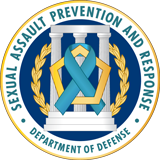SAPRO serves as the DoD’s central authority for sexual assault policy and provides oversight to ensure that each of the Service’s programs comply with DoD policy.
The Under Secretary of Defense for Personnel and Readiness (USD(P&R)) oversees SAPRO. Guidance and oversight of SAPRO is split between the Office of Force Resiliency (OFR) and Defense Human Resources Activity (DHRA). OFR provides day-to-day guidance and DHRA provides operational management and logistical support.
SAPRO is led by a Director appointed from the Senior Executive Service (SES) and a Senior Leader (SL) Deputy Director. Duties of the Director include:
- Oversee implementation of the comprehensive policy for DoD SAPR program;
- Serve as the single point of authority, accountability, and oversight for the SAPR program;
- Provide oversight to ensure that the Military Departments comply with the SAPR program;
- Collect and maintain data of the Military Department on sexual assault;
- Act as a liaison between the DoD and other federal and state agencies on programs and efforts relating to SAPR; and,
- Oversee development of strategic program guidance and joint planning objectives for resources in support of the SAPR program, and make recommendations on modifications to policy, law, and regulations needed to ensure the continuing availability of such resources.
SAPRO is comprised of five teams dedicated to various SAPR program efforts. These teams include:
- Director’s Action Group (strategy and public affairs)
- Victim Assistance and Advocacy
- Policy and Legislative Affairs
- Assessment and Oversight
- Resource Management
SAPRO works in close collaboration with the Office of Command Climate and Well-Being Integration (OCCWI) on primary prevention efforts and the Defense Workforce Development Center (DWDC) on education and training of the prevention and response workforces.
The Defense Advisory Committee for the Prevention of Sexual Misconduct (DAC-PSM) provides independent advice and recommendations on policies, programs, practices, and prevention of military sexual assault.
